I wouldn't call Holmgardr very Absolutist given how much Rurik depends on his council of advisors!The concession to RL is grudging but necessary. Turkey and Rurik are now taking turns - a very democratic approach for two absolutist nations!


Blut und Schlacht (Blood and Battle): A Learner’s Saga
- Thread starter Bullfilter
- Start date
-
We have updated our Community Code of Conduct. Please read through the new rules for the forum that are an integral part of Paradox Interactive’s User Agreement.
You are using an out of date browser. It may not display this or other websites correctly.
You should upgrade or use an alternative browser.
You should upgrade or use an alternative browser.
Threadmarks
View all 262 threadmarks
Reader mode
Reader mode
Recent threadmarks
Chapter 159: The Valkyries’ Friend Three: Die Hard with a Vengeance (March 1021 to June 1024) Chapter 160: How do you solve a problem like Hafrid? (June 1024 to July 1026) Chapter 161: Faith, Gold and Ambition (August 1026 to June 1029) Chapter 162: War, Gold and Conquest (July 1029 – December 1031) Chapter 163: Helgi Rurikid and the Chamber of Secrets (December 1031 – October 1032) Chapter 164: Tyrs for Fears (October 1032 - September 1035) Chapter 165: A Lesson in Diplomacy (September 1035 – June 1039) Chapter 166: A Sliding Door (July 1039 – November 1041)Fair cop, I was thinking a bit too in-game and feudal monarchy. Still, it’s no democracy - but yes, very advice-based in the Thing.I wouldn't call Holmgardr very Absolutist given how much Rurik depends on his council of advisors!
Last edited:
Chapter 7: Toropets Must Fall! (8 April – 26 September 868)
Chapter 7: Toropets Must Fall! (8 April – 26 September 868)
April 868
The next batch of the Rurikid scroll trove has been translated and rendered by scholars into this next update. The narrative resumes with Rurik’s standing army (boosted by zealots and followers of his legendary exploits) preparing to march towards Toropets. While there is a range of pretexts available, including a valid ducal claim, this will (as Rurik had anticipated and was soundly endorsed by his court and counsellors) be a war of conquest.
Gumarich also noted in his official diary of events that the King, while rallying his forces, was conscious that his two flank commanders – his two powerful vassals, Chief Svetozar of Luki and Chief Vsemil of Belo Ozero – were both Slovenskys. As is Chief Sviatopolk of Toropets, the target of the campaign. Vsemil is indeed Sviatopolk’s brother! Furthermore, Sviatopolk’s other brother is Chief Radoslav of neighbouring Torzhok, who had a strong, inheritable claim of his own on Toropets. As did Svetozar – a tangled web. So far, neither Svetozar nor Vsemil had voiced any concerns; of which Rurik or his scribe were aware, anyway. And it remained to be seen what Radoslav may do once Toropets is invaded.
In the cut-throat tribal world of this time, perhaps none of these relationships will end up mattering too much. But the Slovensky family in general seems powerful, numerous and interconnected: they would bear careful watching in the future.
Before he led his army south towards Toropets, Rurik sought marriage arrangements for the two new debutants to his court. He wished to ensure the propagation of good Norse German stock in as many key positions around the realm as he could. The sooner the better.
The first is between Lady Edla and Alfgeir, the lowborn Steward of Holmgarðr: it must therefore [according to the relevant game screen] be a matrilineal marriage.
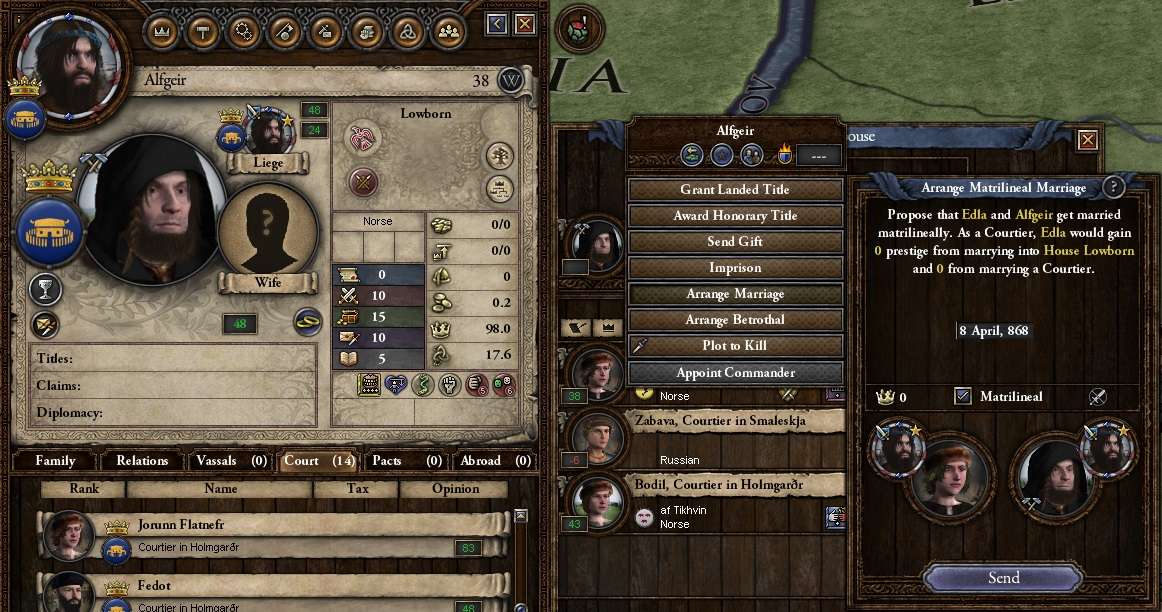
The second proposed nuptial is perhaps more significant: Egill, the unmarried (and Norse) Chief of Smaleskja, is asked and has agreed to wed Bodil. The wedding is celebrated by 13 April. We expect to check on the progress of these unions later in this chronicle.
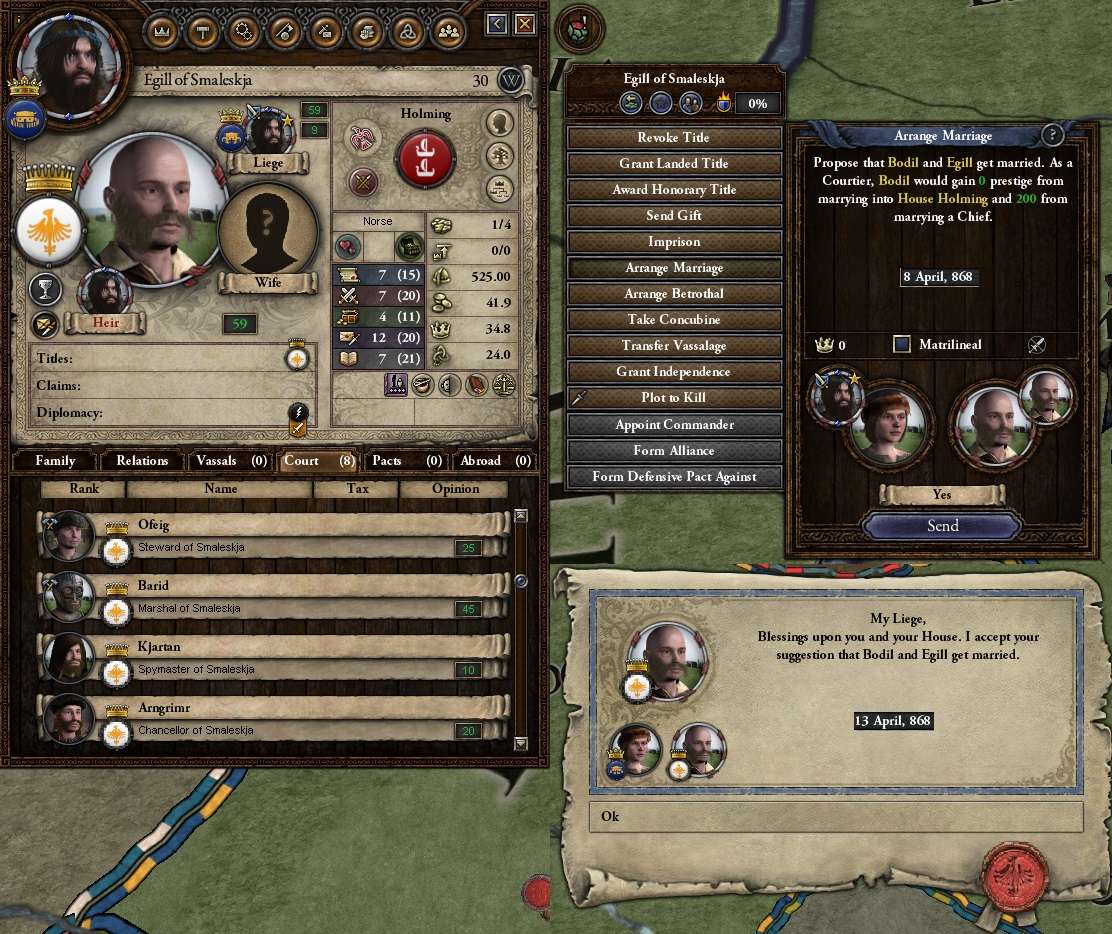
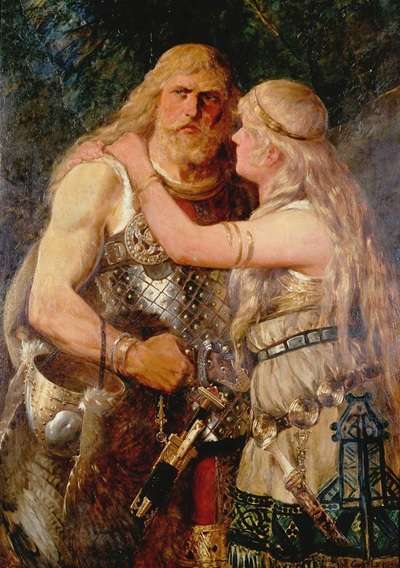
(Arranged) Love is in the Air - Viking style!
With those happy events seen to, the army set out that morning of 8 April 868 – it was due to arrive in Toropets on 2 May. The declaration of war on the hapless Sviatopolk would be made just before the army crossed into his territory
May 868
As the army approaches Toropets, the declaration of war is made. Merciless conquest and usurpation is the objective. The Council advises Rurik he can now legally summon the levies of his vassals to assist but, as he had previously decided, this would not be necessary. He believed he had enough troops already to accomplish the task.
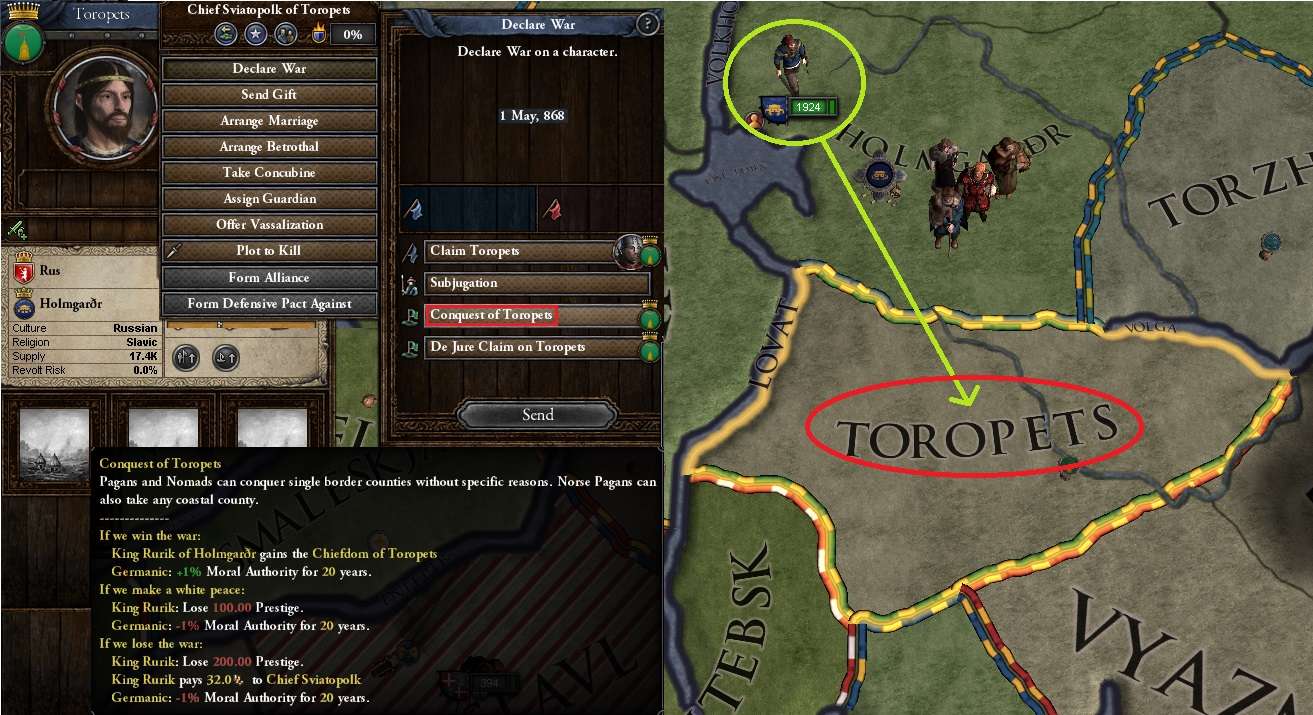
And so, the next day the siege of Toropets’ tribal holding began. As Rurik surveyed the scene, he asked Svetozar his opinion on how long at would take to reduce his enemy’s holding. “My King, I believe it shall take almost four moons to starve them out. Sometime in late August is my best estimate,” Svetozar replied. Rurik had diplomacy enough not to ask this in Vsemil's presence– whose feelings (if any) towards his unenviable and underwhelming brother were not yet clear.
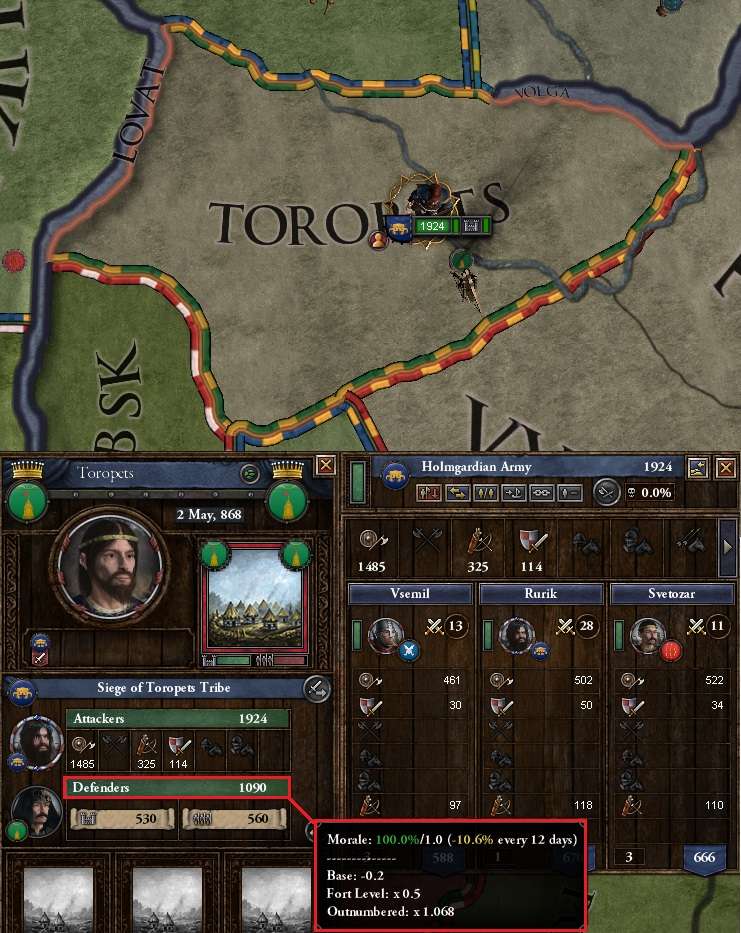
June 868
The siege wore on throughout the summer, as these things tended to do in that period, with no untoward events of note recorded in the notes of Rurik’s (unnamed) battle scribe. On 28 June, Rurik sent a message to his Steward, with orders to provide funds to start constructing forts in two of his vassals’ provinces: Ingria (the only coastal province, home for the fleet and on the flank facing the Finns) and Smaleskja (the exposed southern county and outpost of the realm). They will be finished quickly – by 18 July.
On 30 June, welcome news was received back from the now married Alfgeir: the market villages in Rurik’s home and demesne counties were finished. Other options - some still very expensive compared to the total realm treasury available - are open for more construction and all look useful. One of the more affordable options would be an upgrade to the villages in Holmgarðr and Ladoga. The forts could also be improved, but in the absence of any immediate threat, perhaps that is not a pressing requirement. The military improvements all look desirable - some might be made if large enough hauls of gold can be made from future raiding expeditions. The capital would be the first priority for these. A decision on future building projects was reserved.
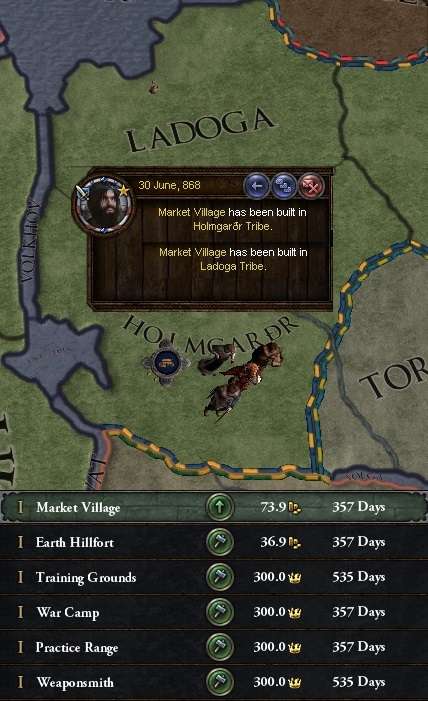

To market, to market!
A small start perhaps, but a typical small Norse market (pictured above) will at least – so Gumarich wrote – begin to build the realm’s wealth steadily - supplemented of course by raiding and conquest.
July 868
A few days later, in the height of summer, a messenger from Holmgarðr pulled up outside Rurik’s tent in a cloud of dust – no doubt accompanied by the smell of dried manure, human waste, unwashed bodies and all the other unpleasant odours of a siege camp that has been occupied two months of summer weather, with ninth century camp hygiene 'procedures'!
“Hail my King! A message from your wife’s chief Lady Attendant …” the messenger wasn’t even able to finish his sentence before Rurik snatched the scroll from him as he walked into the King's open-sided tent.
Rurik laboriously deciphered the crabbed script of the Queen’s companion. Ingjerðr had returned from her technology research mission as her time neared … had gone into labour a few days later and, and … at this point a mixture of fear and anticipation drove all his ability to master the difficult art of reading letters from his mind! Not only was the well-being of his young wife and child-to-be on his mind, but on such events could turn the future of his dynasty. One heir, however young and physically robust – and shielded from battle due to his craven nature – was never enough in such violent and unhealthy times, when longevity was rare and death by disease, violence or murder commonplace.
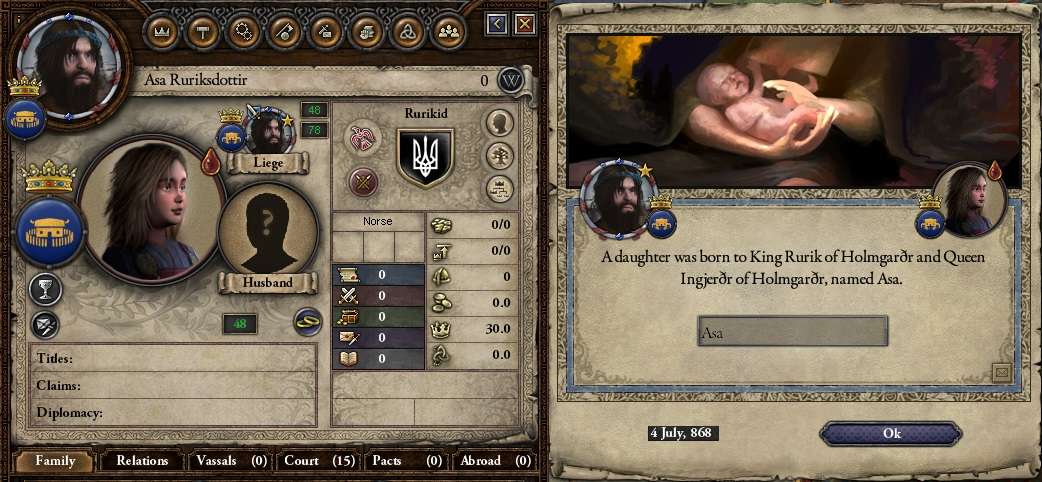
Born on the Fourth of July!
We may well reckon that Rurik would have greeted this news with relief and a degree of pride – a princess of the blood would be a valuable asset as she grew older and a suitable marriage might be arranged and his wife survived – but a part of him must have hoped for another son – even if this might complicate the succession later down the track. Another heir could be the difference between the dynasty thriving or dying, before it had even reached a second generation. Time was short and Rurik was not a young man, though not yet old. But, as there is of course no record of his internal musings, we must take some license and presume these thoughts upon his part. He may also have thought of taking a concubine or two, should he find the right kind of woman, just to make sure. His wife, after all, was a busy woman as Spymaster. And (he may well have mused, judging the the mores of the time) she wouldn't mind - and be-damned if she did!
August 868
As the summer came to a close, so too did the siege of Toropets. The tribal holding was taken and with it the last resistance in Toropets. But Sviatopolk himself was nowhere to be found – he had slipped away either during the siege or as it ended. Knowing his reputation, probably disguised as an old washerwoman or through some other inglorious ruse!
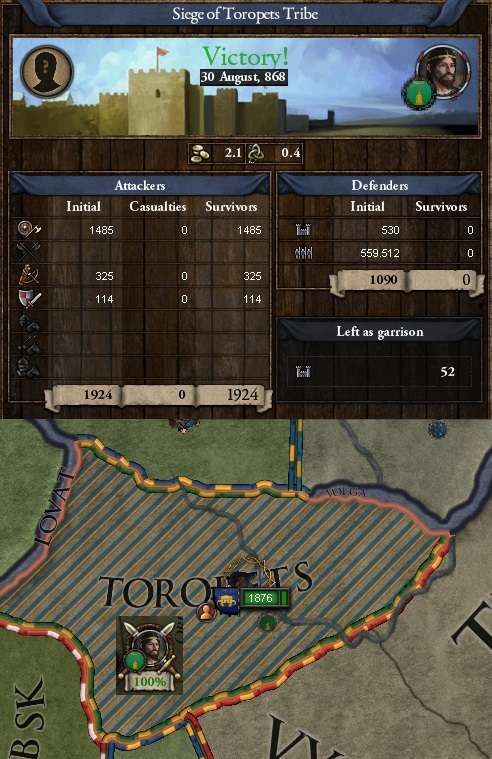
Although they had held up Rurik’s army for the best part of four months, the fortifications in Toropets were rudimentary.

An artist’s depiction of the fortifications of Toropets, as they would have appeared shortly after they were surrendered on 30 August 868.
September 868
While Rurik (naively) awaited negotiations with the displaced Sviatopolk to be conducted following what was his first provincial conquest, it emerged that Sviatopolk had in fact fled to his brother’s keep in Torzhok. In a legal ruse, even though he now harboured his brother, on 2 September Radoslav opportunistically declared a war of subjugation on Toropets, to enforce his own claim: in name against his brother, but clearly against Rurik’s interests. Such slipperiness and impudence would not be allowed to continue!
On hearing this, Rurik immediately (or at least after uttering a string of vile Viking curses, which were perhaps mercifully not recorded for posterity in the battle diary) simply declared the conquest of Toropets complete and usurped the Chiefdom directly to his own demesne. The landless ex-Chief of Toropets – now known only as Sviatopolk Gostevidovich – could lick his wounds in Radoslav’s court, for all Rurik cared. This abruptly extinguished Radoslav’s cheap ploy. If he was wise, he should be looking to his own defences, as neither he nor his un-landed sibling were likely to be safe in Torzhok for long!
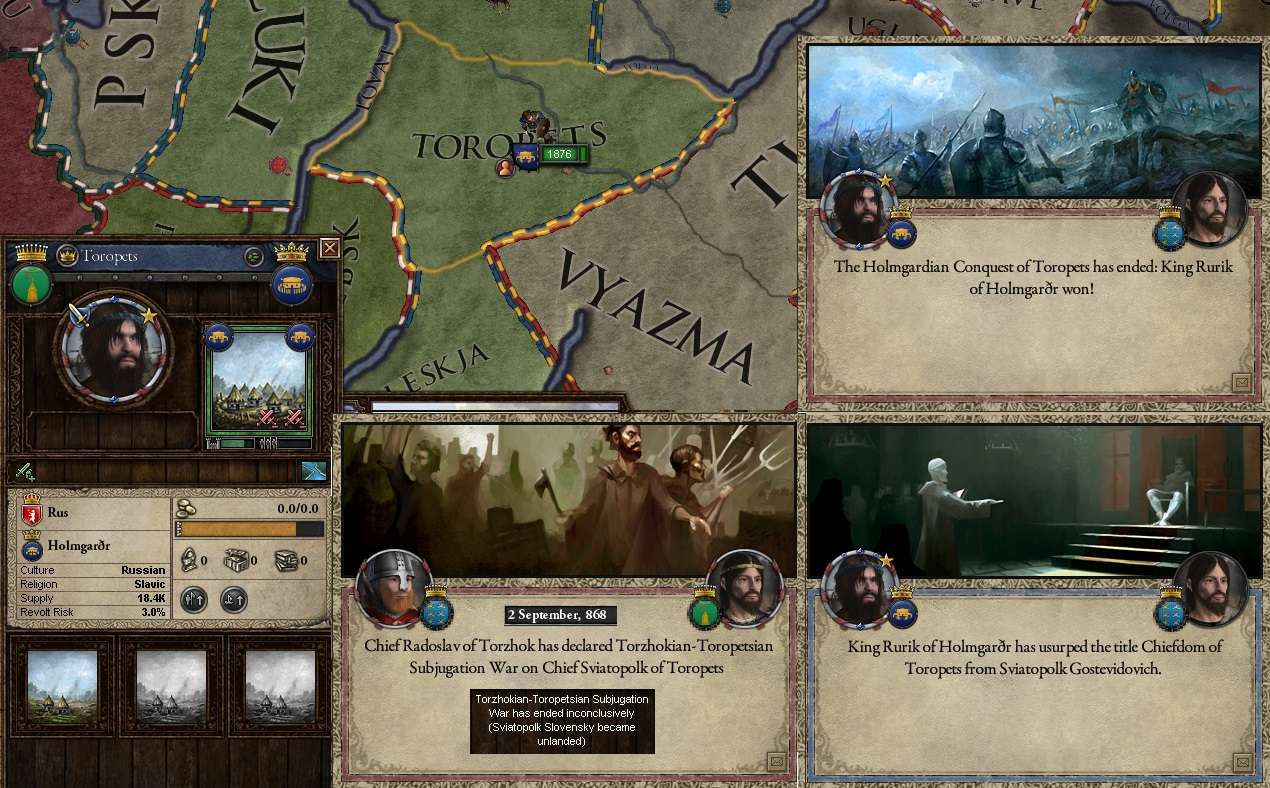
Rurik’s first action on securing Toropets as his third personal demesne county was to order the construction of a fort to improve its defences.
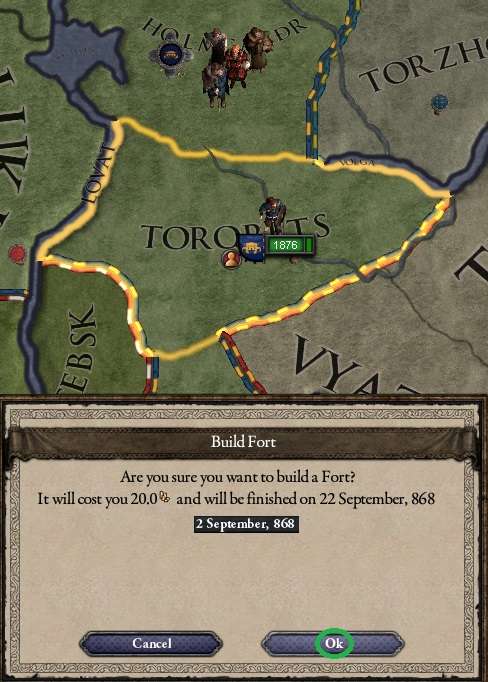
His next action was to ponder where next the army should strike. And therefore to where it should next move. The choice remained between raiding again, or moving on Torzhok straight away, to complete the unification of the de jure Duchy of Holmgarðr and eliminate any residual threat from Radoslav should the next raid take Rurik far from home – as was likely. He reviewed what he already knew about the situation in Torzhok; Radoslav’s strengths (including a decent martial reputation), the levy he could call on (small, a little over 500) and his family situation. He had two young sons as heirs, his strong claim on Toropets (which would surely continue to exercise his imagination) and – as previously mentioned – a powerful vassal of Rurik’s as a brother (Vsemil), and another as a more distant Slovensky family relation (Svetozar).
Apart from religious differences (a common problem for Rurik in these heathen Slavic lands) it was that outstanding claim on Toropets that created the major enmity Radoslav felt for Rurik. As an aside, it seemed to the King (in thoughts kept only to himself and later confided in secrecy to Gumarich, 'for the record') there were too many of these Slovenskys littering the landscape like creeping vines: his own vassals he would keep an eye on for now, as they remained useful – but perhaps the rest should be pruned back. Severely!
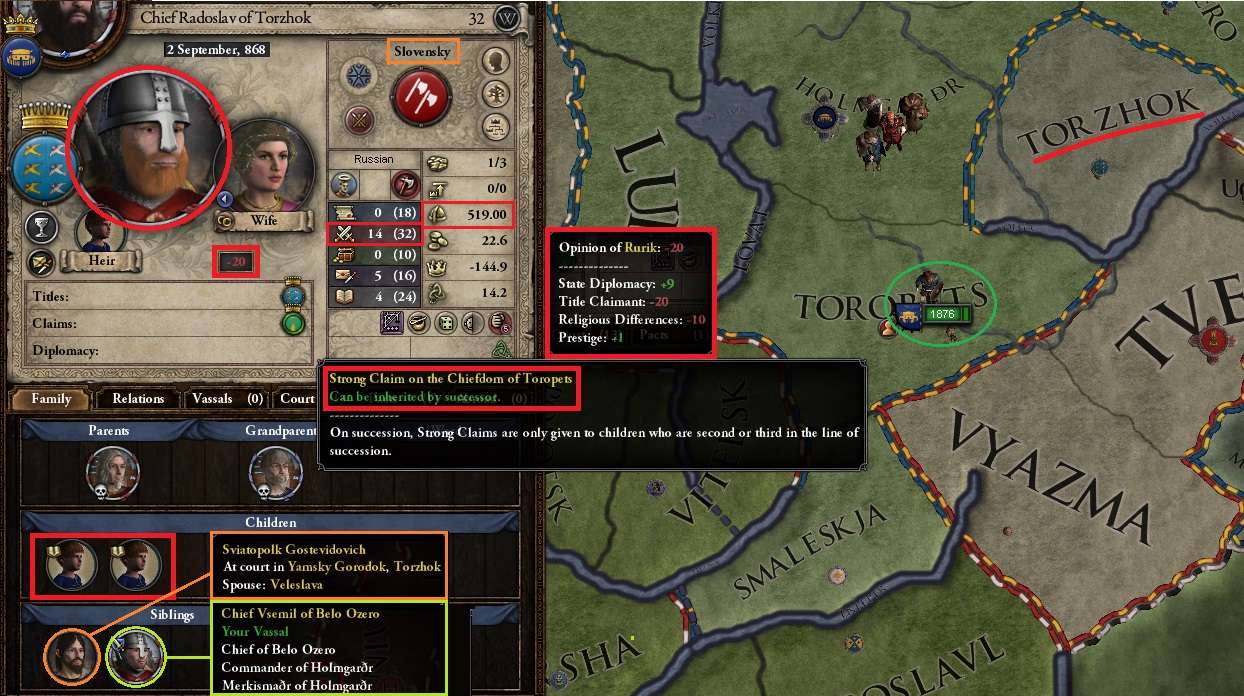
In either case, given the Volga River was a major obstacle on the line of march between Toropets and Torzhok, Rurik ordered the army back to Holmgarðr. It would arrive towards the end of the month. From there, they could either move north to the boats or south to Torzhok.
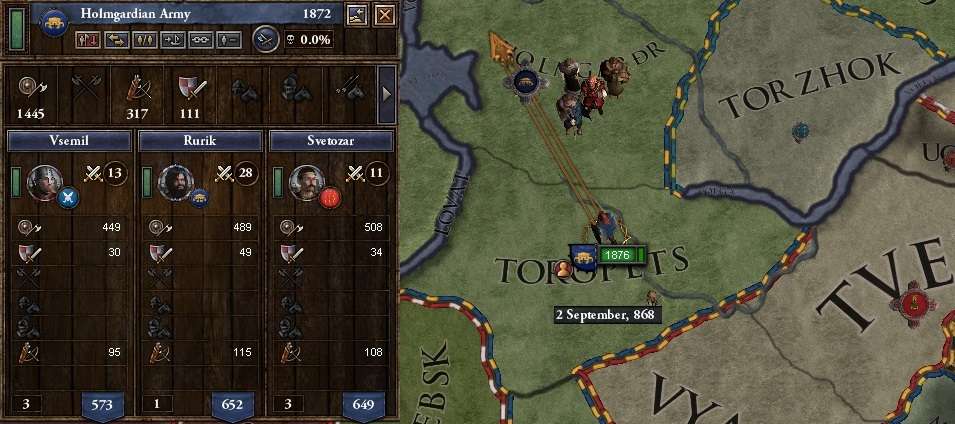
As the army marched back, a new map of the recently expanded realm was provided to Rurik. He was admiring it – especially the now linked southern route to Smaleskja - when both Vsemil and Svetozar awkwardly approached him while he sat in front of his morning campfire. By this stage (17 September) the army had been on the march back home to Holmgarðr for two weeks.
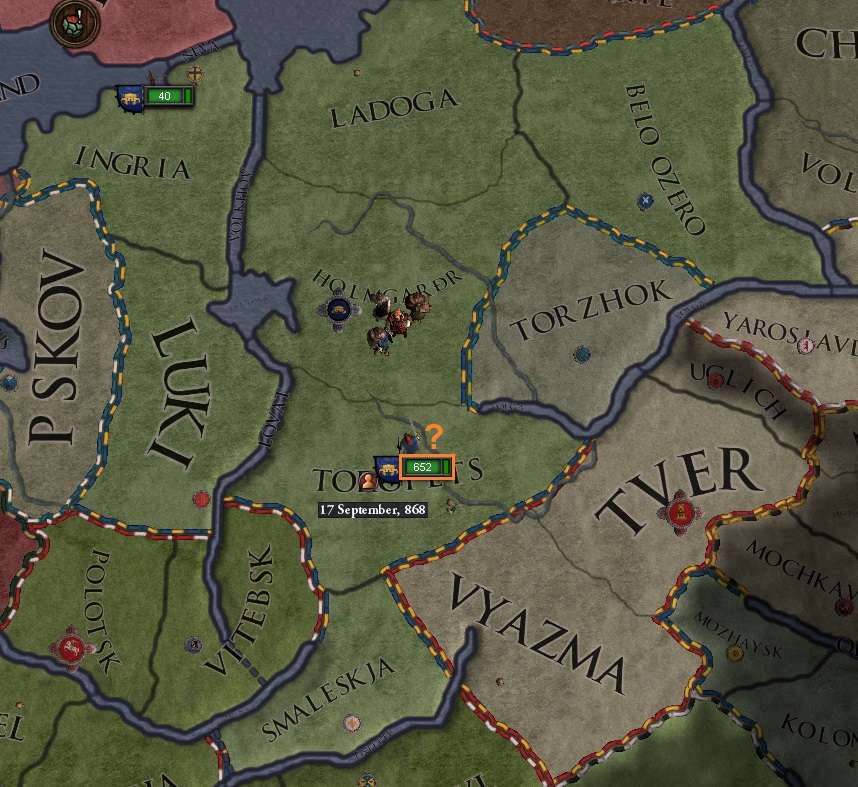
Both the Chiefs stood with heads lowered, but glancing up as unobtrusively as they could, not sure how their King would react. Rurik sat quietly, contemplating the embers of the morning campfire. But as they slowly cooled, so too did any anger that may have initially burned inside him.
The reduced army arrived back in Holmgarðr on 26 September. The military choices were clear: board the fleet again in Ingria, with a strong reinforcement of levies (though not leaving the realm completely defenceless in case of emergency), to raid further afield and more ambitiously. Or march immediately on Torzhok, complete the unification of the de jure duchy and eliminate any potential threat from Radoslav and the displaced Sviatopolk. Doing nothing was not an option!
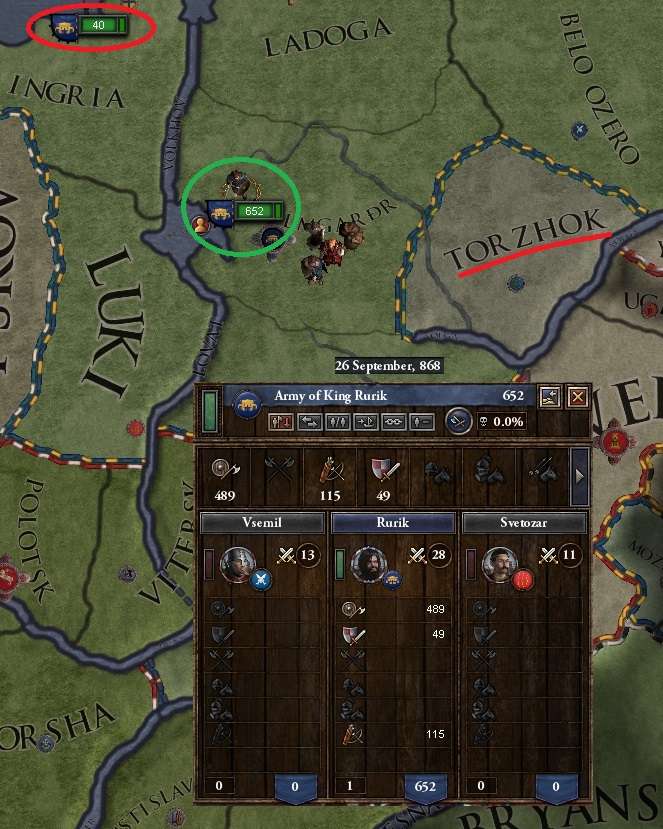
A conquest of Torzhok could be achieved by sending in the standing King’s Guard early to attempt to prevent Radoslav’s levy from mustering, while sufficient Holmgarðian levies (demesne and potentially from the vassals) were mustered to see through another conquest and speed up the presumed siege of Radoslav’s tribal stronghold. Rurik’s first instinct was to deal with the problem closest to home before heading off raiding again, but perhaps others may offer alternative counsel, or even argue that both objectives could be achieved at once. Maybe war could be declared, levies mustered, but then split between seizing Torzhok and raiding the Saxons in Britannia.
In the interim, Gumarich had been busy, seeking the best Viking mapmakers for information on both the political situation in Britannia – the preferred location for the next major raiding expedition – and estimates of the wealthiest potential targets (using reputed tax receipts as a measure).
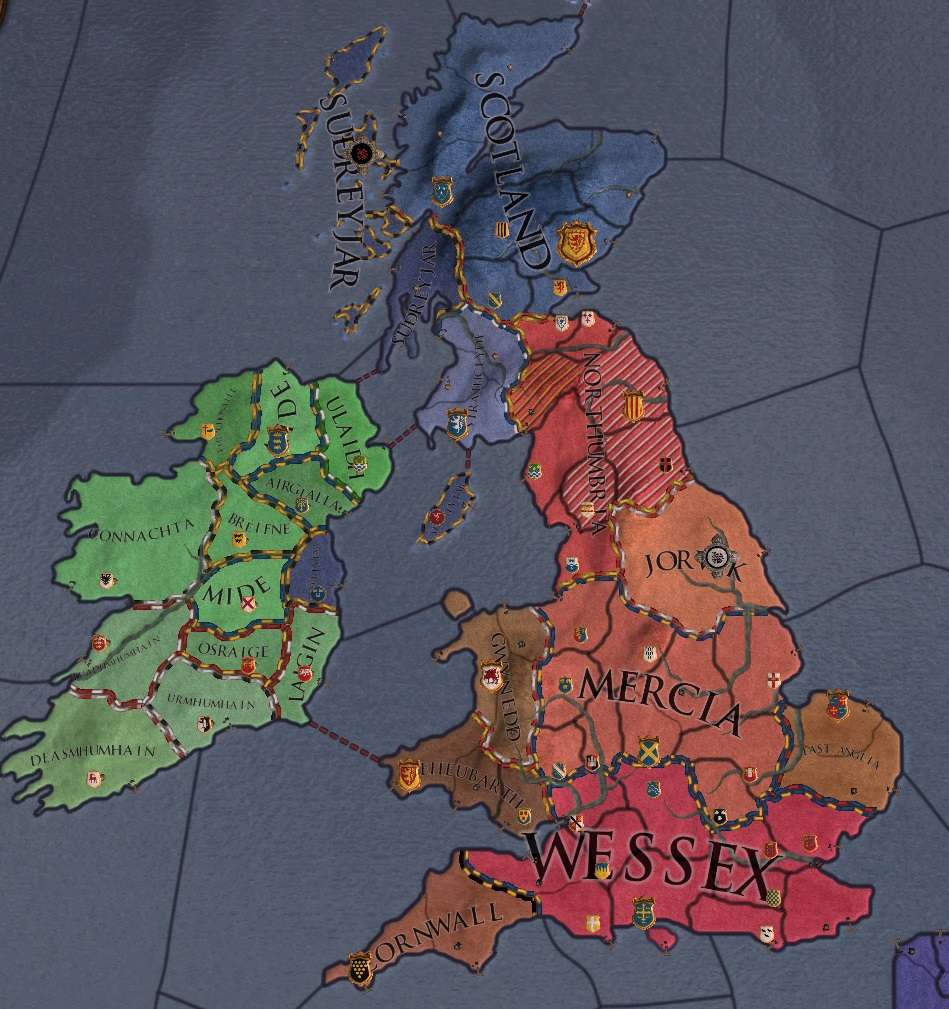
Realms in Britannia, September 868.
Wessex and Mercia are the two largest Anglo-Saxon petty kingdoms in Britannia, with a few others filling up the edges around them. Ireland is a hodgepodge of minor counties. Due to both estimated wealth and a lack of appetite for tackling other Norse realms in Britannia, the focus of attention will remain on the southern Saxon realms.
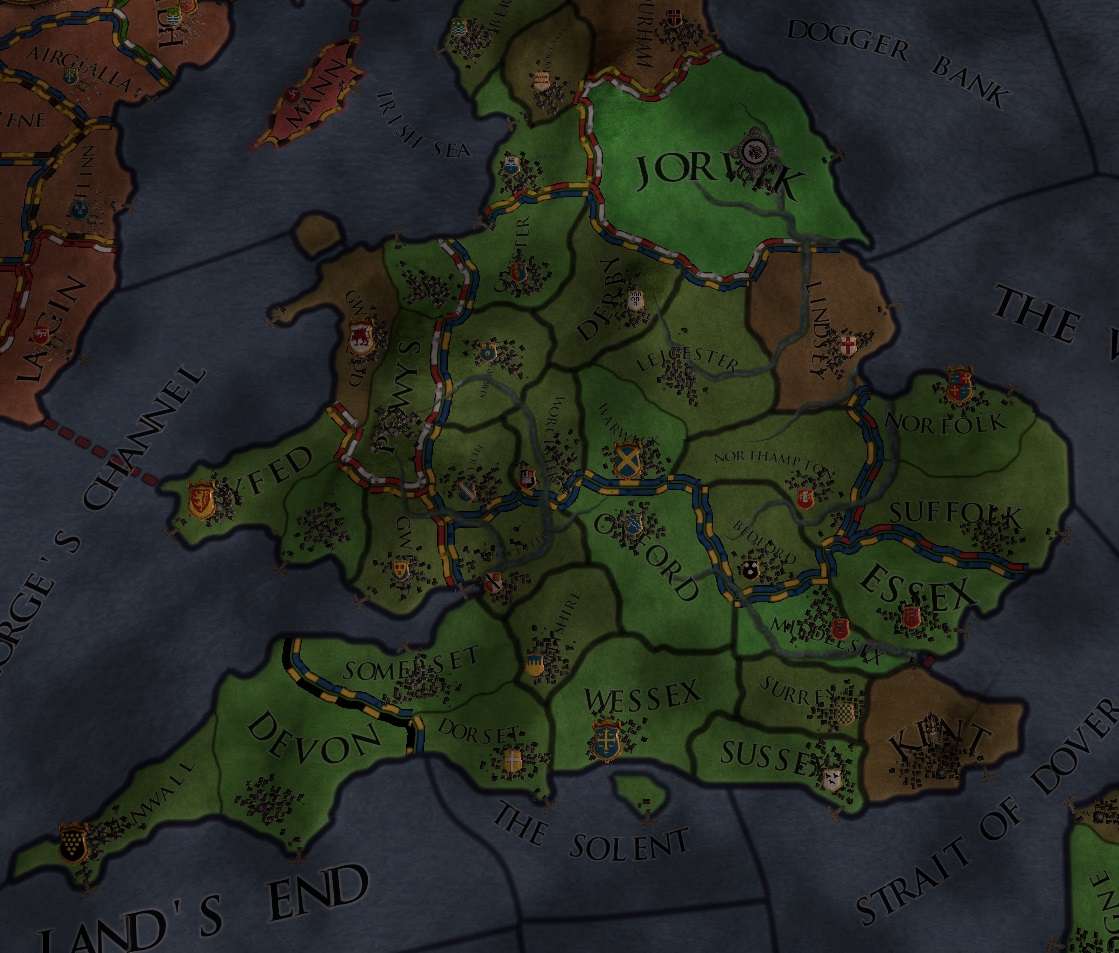
Wiki the Red's Raiding Map of Britannia, September 868. He seeks to identify the best value proposition!
The estimate of the richest raiding grounds confirms the political analysis, while Jorvik will be avoided. The southern and south-eastern coasts appear to offer the richest pickings and easiest access.
Finally, as Rurik instructs Hrörekr to convene another Thing to consider these weighty issues, he also contemplates a new mission for his Chancellor. There seems no point for now in trying to fabricate new claims or pressing need to sow dissent anywhere [with the DLC I have installed, these are the only three missions available]. Surveying his vassals, the only one with the lowest regard for him is Svetozar, the most powerful of the vassals. He also has a Strong Claim on Torzhok. He is Envious of character, regards Rurik as a foreigner, has religious differences and most of all dislikes Rurik’s Zealotry. These are balanced out by many positives, leaving him cool but polite towards his King. Rurik thinks this could be improved through Hrörekr diplomatic skills as Chancellor.
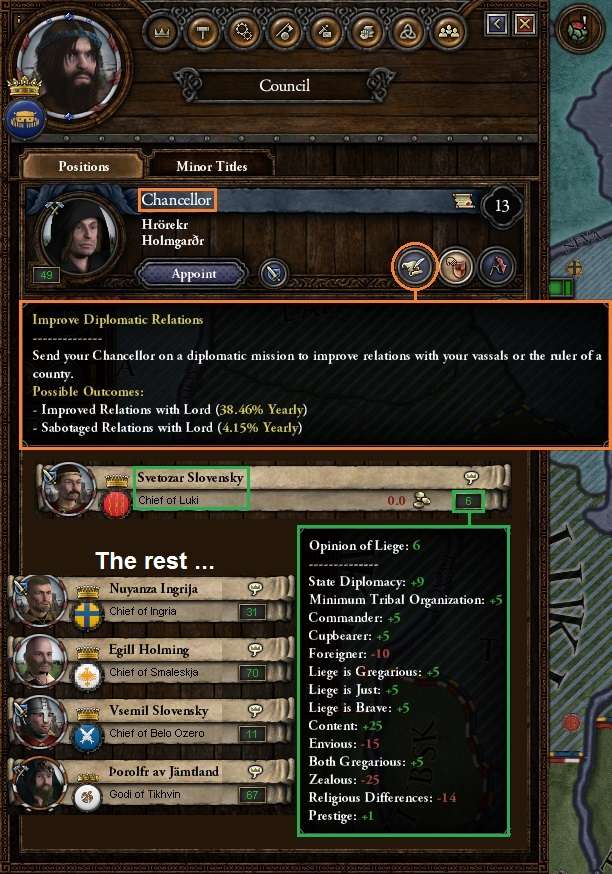
So end the events of Rurik’s reign from the late spring through to early autumn of 868: a conquest, a royal birth, a triumphant return and decisions about the next major step for Holmgarðr. More will be said in the next chapter of homecomings, events and celebrations following Rurik’s victorious return.
As always, all are welcome to the next Thing, where past actions and future options can all be freely discussed and all opinions are welcome.
Summary of Questions for debate at the Third Thing of Rurik’s Reign
Ch7 Q1: Zealots and Volunteers. The zealots appeared on 7 October 867, while the tribal ‘legend warriors’ appeared on 27 March 868. Was the end of the war enough to trigger their departure, ‘moral contract’ satisfied? Are there any aspects to handling such gratis levies dear readers are able to share? And did Rurik make any error in heading back home with those levies when he (I) did, or would this have happened anyway? PS: I’m not sure of the exact date they deserted – it’s just I only noticed on the 17th, as they marched back to Holmgarðr. But they were certainly there as they set off on 2 September, immediately after the conquest was completed.
Ch 7 Q2: To Raid or Conquer. Any advice on considerations, timings, priorities and options – especially whether (numerically and ‘legally’) a simultaneous raid and conquer option would be feasible and (if so) desirable would be welcomed. If not, then which seems the most urgent – noting either will take some time, as another 3-4 month siege would be expected in Torzhok.
Ch7 Q3: Chancellor’s Next Mission. The Thing is therefore asked about whether improving relations with Chief Svetozar seems a worthwhile use of the Chancellor’s time, when compared to the other two available missions (neither of which seem particularly useful at this point). Maybe a gift or additional appointment could be made, as well. Most of other vassals all seem quite favourably disposed, though Svetozar’s Slovensky kinsman Vsemil is only moderately better disposed.

Many thanks for reading and may Odin lend strength to your sword arm!
April 868
The next batch of the Rurikid scroll trove has been translated and rendered by scholars into this next update. The narrative resumes with Rurik’s standing army (boosted by zealots and followers of his legendary exploits) preparing to march towards Toropets. While there is a range of pretexts available, including a valid ducal claim, this will (as Rurik had anticipated and was soundly endorsed by his court and counsellors) be a war of conquest.
“Prepare to march, men of Holmgarðr!” proclaimed Rurik, as recorded by Gumarich the Scribe in the annals of 868. “We fight to enforce my legitimate claim on Toropets. To once again unite the realm and ensure our chiefdom of Smaleskja is linked with the rest of the us. And to oust the unworthy wastrel who currently rules it. Toropets must fall!” The last is shouted, as a battle cry.
Gumarich also noted in his official diary of events that the King, while rallying his forces, was conscious that his two flank commanders – his two powerful vassals, Chief Svetozar of Luki and Chief Vsemil of Belo Ozero – were both Slovenskys. As is Chief Sviatopolk of Toropets, the target of the campaign. Vsemil is indeed Sviatopolk’s brother! Furthermore, Sviatopolk’s other brother is Chief Radoslav of neighbouring Torzhok, who had a strong, inheritable claim of his own on Toropets. As did Svetozar – a tangled web. So far, neither Svetozar nor Vsemil had voiced any concerns; of which Rurik or his scribe were aware, anyway. And it remained to be seen what Radoslav may do once Toropets is invaded.
In the cut-throat tribal world of this time, perhaps none of these relationships will end up mattering too much. But the Slovensky family in general seems powerful, numerous and interconnected: they would bear careful watching in the future.
Before he led his army south towards Toropets, Rurik sought marriage arrangements for the two new debutants to his court. He wished to ensure the propagation of good Norse German stock in as many key positions around the realm as he could. The sooner the better.
The first is between Lady Edla and Alfgeir, the lowborn Steward of Holmgarðr: it must therefore [according to the relevant game screen] be a matrilineal marriage.

The second proposed nuptial is perhaps more significant: Egill, the unmarried (and Norse) Chief of Smaleskja, is asked and has agreed to wed Bodil. The wedding is celebrated by 13 April. We expect to check on the progress of these unions later in this chronicle.


(Arranged) Love is in the Air - Viking style!
With those happy events seen to, the army set out that morning of 8 April 868 – it was due to arrive in Toropets on 2 May. The declaration of war on the hapless Sviatopolk would be made just before the army crossed into his territory
A time-tested ploy I’ve used in HoI3 to achieve maximum surprise, and one I’ve seen described on a few CK2 AARs as well. It seems so long as one has enough force before calling up levies, you can hit the target before they can muster theirs. I assume this should be even more effective when attacking a one-county adversary.
May 868
As the army approaches Toropets, the declaration of war is made. Merciless conquest and usurpation is the objective. The Council advises Rurik he can now legally summon the levies of his vassals to assist but, as he had previously decided, this would not be necessary. He believed he had enough troops already to accomplish the task.

And so, the next day the siege of Toropets’ tribal holding began. As Rurik surveyed the scene, he asked Svetozar his opinion on how long at would take to reduce his enemy’s holding. “My King, I believe it shall take almost four moons to starve them out. Sometime in late August is my best estimate,” Svetozar replied. Rurik had diplomacy enough not to ask this in Vsemil's presence– whose feelings (if any) towards his unenviable and underwhelming brother were not yet clear.

June 868
The siege wore on throughout the summer, as these things tended to do in that period, with no untoward events of note recorded in the notes of Rurik’s (unnamed) battle scribe. On 28 June, Rurik sent a message to his Steward, with orders to provide funds to start constructing forts in two of his vassals’ provinces: Ingria (the only coastal province, home for the fleet and on the flank facing the Finns) and Smaleskja (the exposed southern county and outpost of the realm). They will be finished quickly – by 18 July.
On 30 June, welcome news was received back from the now married Alfgeir: the market villages in Rurik’s home and demesne counties were finished. Other options - some still very expensive compared to the total realm treasury available - are open for more construction and all look useful. One of the more affordable options would be an upgrade to the villages in Holmgarðr and Ladoga. The forts could also be improved, but in the absence of any immediate threat, perhaps that is not a pressing requirement. The military improvements all look desirable - some might be made if large enough hauls of gold can be made from future raiding expeditions. The capital would be the first priority for these. A decision on future building projects was reserved.


To market, to market!
A small start perhaps, but a typical small Norse market (pictured above) will at least – so Gumarich wrote – begin to build the realm’s wealth steadily - supplemented of course by raiding and conquest.
July 868
A few days later, in the height of summer, a messenger from Holmgarðr pulled up outside Rurik’s tent in a cloud of dust – no doubt accompanied by the smell of dried manure, human waste, unwashed bodies and all the other unpleasant odours of a siege camp that has been occupied two months of summer weather, with ninth century camp hygiene 'procedures'!
“Hail my King! A message from your wife’s chief Lady Attendant …” the messenger wasn’t even able to finish his sentence before Rurik snatched the scroll from him as he walked into the King's open-sided tent.
Rurik laboriously deciphered the crabbed script of the Queen’s companion. Ingjerðr had returned from her technology research mission as her time neared … had gone into labour a few days later and, and … at this point a mixture of fear and anticipation drove all his ability to master the difficult art of reading letters from his mind! Not only was the well-being of his young wife and child-to-be on his mind, but on such events could turn the future of his dynasty. One heir, however young and physically robust – and shielded from battle due to his craven nature – was never enough in such violent and unhealthy times, when longevity was rare and death by disease, violence or murder commonplace.
“Here, read this out to me lad!” he said as he handed the message over to his young war scribe, one of Gumarich’s apprentices.
“Of course my King,” the young scribe began to read. “’On the Fourth day of July, after a long and arduous but otherwise untroubled labour, Queen Ingjerðr gave birth to a healthy baby girl. Both appear to be in good health. As agreed between you before your departure to battle, as a girl she will be named Asa. May the blessings of Mighty Odin and all the Gods be upon you.’”
“Of course my King,” the young scribe began to read. “’On the Fourth day of July, after a long and arduous but otherwise untroubled labour, Queen Ingjerðr gave birth to a healthy baby girl. Both appear to be in good health. As agreed between you before your departure to battle, as a girl she will be named Asa. May the blessings of Mighty Odin and all the Gods be upon you.’”

Born on the Fourth of July!
We may well reckon that Rurik would have greeted this news with relief and a degree of pride – a princess of the blood would be a valuable asset as she grew older and a suitable marriage might be arranged and his wife survived – but a part of him must have hoped for another son – even if this might complicate the succession later down the track. Another heir could be the difference between the dynasty thriving or dying, before it had even reached a second generation. Time was short and Rurik was not a young man, though not yet old. But, as there is of course no record of his internal musings, we must take some license and presume these thoughts upon his part. He may also have thought of taking a concubine or two, should he find the right kind of woman, just to make sure. His wife, after all, was a busy woman as Spymaster. And (he may well have mused, judging the the mores of the time) she wouldn't mind - and be-damned if she did!
August 868
As the summer came to a close, so too did the siege of Toropets. The tribal holding was taken and with it the last resistance in Toropets. But Sviatopolk himself was nowhere to be found – he had slipped away either during the siege or as it ended. Knowing his reputation, probably disguised as an old washerwoman or through some other inglorious ruse!


An artist’s depiction of the fortifications of Toropets, as they would have appeared shortly after they were surrendered on 30 August 868.
September 868
While Rurik (naively) awaited negotiations with the displaced Sviatopolk to be conducted following what was his first provincial conquest, it emerged that Sviatopolk had in fact fled to his brother’s keep in Torzhok. In a legal ruse, even though he now harboured his brother, on 2 September Radoslav opportunistically declared a war of subjugation on Toropets, to enforce his own claim: in name against his brother, but clearly against Rurik’s interests. Such slipperiness and impudence would not be allowed to continue!
On hearing this, Rurik immediately (or at least after uttering a string of vile Viking curses, which were perhaps mercifully not recorded for posterity in the battle diary) simply declared the conquest of Toropets complete and usurped the Chiefdom directly to his own demesne. The landless ex-Chief of Toropets – now known only as Sviatopolk Gostevidovich – could lick his wounds in Radoslav’s court, for all Rurik cared. This abruptly extinguished Radoslav’s cheap ploy. If he was wise, he should be looking to his own defences, as neither he nor his un-landed sibling were likely to be safe in Torzhok for long!

Rurik’s first action on securing Toropets as his third personal demesne county was to order the construction of a fort to improve its defences.

His next action was to ponder where next the army should strike. And therefore to where it should next move. The choice remained between raiding again, or moving on Torzhok straight away, to complete the unification of the de jure Duchy of Holmgarðr and eliminate any residual threat from Radoslav should the next raid take Rurik far from home – as was likely. He reviewed what he already knew about the situation in Torzhok; Radoslav’s strengths (including a decent martial reputation), the levy he could call on (small, a little over 500) and his family situation. He had two young sons as heirs, his strong claim on Toropets (which would surely continue to exercise his imagination) and – as previously mentioned – a powerful vassal of Rurik’s as a brother (Vsemil), and another as a more distant Slovensky family relation (Svetozar).
Apart from religious differences (a common problem for Rurik in these heathen Slavic lands) it was that outstanding claim on Toropets that created the major enmity Radoslav felt for Rurik. As an aside, it seemed to the King (in thoughts kept only to himself and later confided in secrecy to Gumarich, 'for the record') there were too many of these Slovenskys littering the landscape like creeping vines: his own vassals he would keep an eye on for now, as they remained useful – but perhaps the rest should be pruned back. Severely!

In either case, given the Volga River was a major obstacle on the line of march between Toropets and Torzhok, Rurik ordered the army back to Holmgarðr. It would arrive towards the end of the month. From there, they could either move north to the boats or south to Torzhok.

As the army marched back, a new map of the recently expanded realm was provided to Rurik. He was admiring it – especially the now linked southern route to Smaleskja - when both Vsemil and Svetozar awkwardly approached him while he sat in front of his morning campfire. By this stage (17 September) the army had been on the march back home to Holmgarðr for two weeks.
“My liege,” Vsemil said, with more hesitation and deference in voice and manner than was his wont. “I must report to you that overnight, the force of zealots under my command has melted away. None are left. There was no complaint or warning from them or their officers before they left, nor can I find any definite explanation in the wake of their desertion. My abject apologies, my liege.”
“Vsemil, this is an outrage!” Rurik said firmly, though he maintained his equilibrium. His sense of justice prevented him casting blame before there was proven cause to do so. “We must see if we can get to the bottom of this. See if any of our special advisers can explain this mystery. I thought this recent war would have been enough to keep them engaged – perhaps the ensuing peace caused them to lose interest. Svetozar, gather your men and we will continue the march back home at once.”
“Ah, hmm, my liege,” said Svetozar, who had been uncharacteristically quiet as Vsemil made his abasement. “Speaking of that, ah, erm, it appears those volunteers who mustered to become a part of the Rurikid Legend must have considered this recent triumph to have slaked their thirst for further glory.”
“By Odin’s Teeth, what are you talking about, man! I can’t stand such mealy-mouthed words and had not thought to hear them from your lips, Svetozar!”
“Yes, my liege, my apologies,” Svetozar continued lamely. He had very little experience in apologising. “The other wing of the army has also left. Whether they were acting in concert or it was simply the same reasoning applied spontaneously as they realised the zealots were striking camp, they too are gone. I woke this morning and every man - officer and soldier alike - had left.”
“Vsemil, this is an outrage!” Rurik said firmly, though he maintained his equilibrium. His sense of justice prevented him casting blame before there was proven cause to do so. “We must see if we can get to the bottom of this. See if any of our special advisers can explain this mystery. I thought this recent war would have been enough to keep them engaged – perhaps the ensuing peace caused them to lose interest. Svetozar, gather your men and we will continue the march back home at once.”
“Ah, hmm, my liege,” said Svetozar, who had been uncharacteristically quiet as Vsemil made his abasement. “Speaking of that, ah, erm, it appears those volunteers who mustered to become a part of the Rurikid Legend must have considered this recent triumph to have slaked their thirst for further glory.”
“By Odin’s Teeth, what are you talking about, man! I can’t stand such mealy-mouthed words and had not thought to hear them from your lips, Svetozar!”
“Yes, my liege, my apologies,” Svetozar continued lamely. He had very little experience in apologising. “The other wing of the army has also left. Whether they were acting in concert or it was simply the same reasoning applied spontaneously as they realised the zealots were striking camp, they too are gone. I woke this morning and every man - officer and soldier alike - had left.”

Both the Chiefs stood with heads lowered, but glancing up as unobtrusively as they could, not sure how their King would react. Rurik sat quietly, contemplating the embers of the morning campfire. But as they slowly cooled, so too did any anger that may have initially burned inside him.
“Very well then. To lose one army, Svetozar, may be regarded as a misfortune; to lose both looks like carelessness.” Rurik replied earnestly. He then looked to his own soldiers, still loyally present and preparing to strike camp. “This is my overall command and I did not see this coming either. Let us see if we can work out why this has happened and learn better how to handle such situations in the future.”
The zealots appeared on 7 October 867, while the tribal ‘legend warriors’ appeared on 27 March 868. Was the end of the war enough to trigger their departure, ‘moral contract’ satisfied? Are there any aspects to handling such gratis levies dear readers are able to share? And did Rurik make any error in heading back home with those levies when he (I) did, or would this have happened anyway? PS: I’m not sure of the exact date they deserted – it’s just I only noticed on the 17th, as they marched back to Holmgarðr. But they were certainly there as they set off on 2 September, immediately after the conquest was completed.
The reduced army arrived back in Holmgarðr on 26 September. The military choices were clear: board the fleet again in Ingria, with a strong reinforcement of levies (though not leaving the realm completely defenceless in case of emergency), to raid further afield and more ambitiously. Or march immediately on Torzhok, complete the unification of the de jure duchy and eliminate any potential threat from Radoslav and the displaced Sviatopolk. Doing nothing was not an option!

A conquest of Torzhok could be achieved by sending in the standing King’s Guard early to attempt to prevent Radoslav’s levy from mustering, while sufficient Holmgarðian levies (demesne and potentially from the vassals) were mustered to see through another conquest and speed up the presumed siege of Radoslav’s tribal stronghold. Rurik’s first instinct was to deal with the problem closest to home before heading off raiding again, but perhaps others may offer alternative counsel, or even argue that both objectives could be achieved at once. Maybe war could be declared, levies mustered, but then split between seizing Torzhok and raiding the Saxons in Britannia.
In the interim, Gumarich had been busy, seeking the best Viking mapmakers for information on both the political situation in Britannia – the preferred location for the next major raiding expedition – and estimates of the wealthiest potential targets (using reputed tax receipts as a measure).

Realms in Britannia, September 868.
Wessex and Mercia are the two largest Anglo-Saxon petty kingdoms in Britannia, with a few others filling up the edges around them. Ireland is a hodgepodge of minor counties. Due to both estimated wealth and a lack of appetite for tackling other Norse realms in Britannia, the focus of attention will remain on the southern Saxon realms.

Wiki the Red's Raiding Map of Britannia, September 868. He seeks to identify the best value proposition!
The estimate of the richest raiding grounds confirms the political analysis, while Jorvik will be avoided. The southern and south-eastern coasts appear to offer the richest pickings and easiest access.
Any advice on considerations, timings, priorities and options – especially whether (numerically and ‘legally’) a simultaneous raid -and-conquer option would be feasible and (if so) desirable would be welcomed. If not, then which seems the most urgent – noting either will take some time, as another 3-4 month siege would be expected in Torzhok.
Finally, as Rurik instructs Hrörekr to convene another Thing to consider these weighty issues, he also contemplates a new mission for his Chancellor. There seems no point for now in trying to fabricate new claims or pressing need to sow dissent anywhere [with the DLC I have installed, these are the only three missions available]. Surveying his vassals, the only one with the lowest regard for him is Svetozar, the most powerful of the vassals. He also has a Strong Claim on Torzhok. He is Envious of character, regards Rurik as a foreigner, has religious differences and most of all dislikes Rurik’s Zealotry. These are balanced out by many positives, leaving him cool but polite towards his King. Rurik thinks this could be improved through Hrörekr diplomatic skills as Chancellor.

The Thing is therefore asked about whether improving relations with Chief Svetozar seems a worthwhile use of the Chancellor’s time, when compared to the other two available missions (neither of which seems particularly useful at this point). Maybe a gift or an additional minor appointment could be made, as well. Most of the other vassals all seem quite favourably disposed, except for Svetozar’s Slovensky kinsman Vsemil, who has only a moderately better opinion of the King.
So end the events of Rurik’s reign from the late spring through to early autumn of 868: a conquest, a royal birth, a triumphant return and decisions about the next major step for Holmgarðr. More will be said in the next chapter of homecomings, events and celebrations following Rurik’s victorious return.
As always, all are welcome to the next Thing, where past actions and future options can all be freely discussed and all opinions are welcome.
Summary of Questions for debate at the Third Thing of Rurik’s Reign
Ch7 Q1: Zealots and Volunteers. The zealots appeared on 7 October 867, while the tribal ‘legend warriors’ appeared on 27 March 868. Was the end of the war enough to trigger their departure, ‘moral contract’ satisfied? Are there any aspects to handling such gratis levies dear readers are able to share? And did Rurik make any error in heading back home with those levies when he (I) did, or would this have happened anyway? PS: I’m not sure of the exact date they deserted – it’s just I only noticed on the 17th, as they marched back to Holmgarðr. But they were certainly there as they set off on 2 September, immediately after the conquest was completed.
Ch 7 Q2: To Raid or Conquer. Any advice on considerations, timings, priorities and options – especially whether (numerically and ‘legally’) a simultaneous raid and conquer option would be feasible and (if so) desirable would be welcomed. If not, then which seems the most urgent – noting either will take some time, as another 3-4 month siege would be expected in Torzhok.
Ch7 Q3: Chancellor’s Next Mission. The Thing is therefore asked about whether improving relations with Chief Svetozar seems a worthwhile use of the Chancellor’s time, when compared to the other two available missions (neither of which seem particularly useful at this point). Maybe a gift or additional appointment could be made, as well. Most of other vassals all seem quite favourably disposed, though Svetozar’s Slovensky kinsman Vsemil is only moderately better disposed.

Many thanks for reading and may Odin lend strength to your sword arm!
Last edited:
- 1
Nicely done with the conquest, a fine start to the game.
Q1 - Zealots and tribal legend warriors are a 1 year use it or lose it proposition. If you do not use zealots in a religious war, or the legend warriors in any war, within one year (raiding does not count) they disappear and you take a negative consequence (better to dismiss them than let that happen). If you use the zealots in a religious war in that timeframe, or the legend warriors in any war during that timeframe, they will disband automatically the day after the peace treaty.
Q2 - I personally would raid for a bit, gather up a warchest, and start with some vassal cleansing, linked with Q3.
Q3 - A point on Chief Svetozar. He hates you because you are Norse (-10), because you are a Germanic Pagan (-14) and because HE (not Rurik) is a Zealous Slav (-25), and envious to boot (-10). You're lucky he's content instead of ambitious, but you will never make him happy. Time to start considering replacing your Slavic tribal chieftains with good Norse stock by judicious application of the Revoke Title button. Cultural and religious unity are paramount to a stable realm, and it all starts at the top. I'd start in on it once you convincingly outnumber your vassals. By all means send in the chancellor for now but just keep in the back of your mind that eventually they are all going to cause problems down the road and need to be replaced.
Summary, or TL;DR: 1) Raid for loot to enable 2)Conquer the neighborhood until you can embark on some 3)Vassal ethnic cleansing.
Sounds terrible but it's CK2. No points for getting killed by a Zealous Slavic vassal.
Q1 - Zealots and tribal legend warriors are a 1 year use it or lose it proposition. If you do not use zealots in a religious war, or the legend warriors in any war, within one year (raiding does not count) they disappear and you take a negative consequence (better to dismiss them than let that happen). If you use the zealots in a religious war in that timeframe, or the legend warriors in any war during that timeframe, they will disband automatically the day after the peace treaty.
Q2 - I personally would raid for a bit, gather up a warchest, and start with some vassal cleansing, linked with Q3.
Q3 - A point on Chief Svetozar. He hates you because you are Norse (-10), because you are a Germanic Pagan (-14) and because HE (not Rurik) is a Zealous Slav (-25), and envious to boot (-10). You're lucky he's content instead of ambitious, but you will never make him happy. Time to start considering replacing your Slavic tribal chieftains with good Norse stock by judicious application of the Revoke Title button. Cultural and religious unity are paramount to a stable realm, and it all starts at the top. I'd start in on it once you convincingly outnumber your vassals. By all means send in the chancellor for now but just keep in the back of your mind that eventually they are all going to cause problems down the road and need to be replaced.
Summary, or TL;DR: 1) Raid for loot to enable 2)Conquer the neighborhood until you can embark on some 3)Vassal ethnic cleansing.
Sounds terrible but it's CK2. No points for getting killed by a Zealous Slavic vassal.
Ch7 Q1: Zealots and Volunteers. The zealots appeared on 7 October 867, while the tribal ‘legend warriors’ appeared on 27 March 868. Was the end of the war enough to trigger their departure, ‘moral contract’ satisfied? Are there any aspects to handling such gratis levies dear readers are able to share? And did Rurik make any error in heading back home with those levies when he (I) did, or would this have happened anyway? PS: I’m not sure of the exact date they deserted – it’s just I only noticed on the 17th, as they marched back to Holmgarðr. But they were certainly there as they set off on 2 September, immediately after the conquest was completed.
I'm not sure about zealots and volunteers, but I'm familiar with raised tribal armies. The latter stick around until you're in peace, so one trick to maximise the benefit from them is to stay in war. So long as you have no levies raised, you can simply declare war on the next target and march in your tribal army. Gets the most out of the prestige cost.
Ch 7 Q2: To Raid or Conquer. Any advice on considerations, timings, priorities and options – especially whether (numerically and ‘legally’) a simultaneous raid and conquer option would be feasible and (if so) desirable would be welcomed. If not, then which seems the most urgent – noting either will take some time, as another 3-4 month siege would be expected in Torzhok.
Has Torzhok been at war lately? If so, their levies are still recovering. If not, then your levies will outpace them even more if you wait. I doubt you have to worry about Radoslav raising a tribal army of his own, since he has negative prestige.
Ch7 Q3: Chancellor’s Next Mission. The Thing is therefore asked about whether improving relations with Chief Svetozar seems a worthwhile use of the Chancellor’s time, when compared to the other two available missions (neither of which seem particularly useful at this point). Maybe a gift or additional appointment could be made, as well. Most of other vassals all seem quite favourably disposed, though Svetozar’s Slovensky kinsman Vsemil is only moderately better disposed.
Short-term, appeasing a powerful vassal can be useful. But Rurik is regarded as an outsider. His Slavic Russian vassals are always going to be at a higher risk of revolt and will give fewer levies and less tax because they like Rurik less. So for the long-term, replacing them with Norse is a good idea, if potentially painful in revolts in the short-term.
The tribal warriors disappearing has caught me off-guard before as well - others have answered that better than I.
Raid to get some money, to use to conquer land nearer to home - maybe. I won't claim to be an expert.
Raid to get some money, to use to conquer land nearer to home - maybe. I won't claim to be an expert.
An artist’s depiction of the fortifications of Toropets, as they would have appeared shortly after they were surrendered on 30 August 868.
Those aren't that bad for a minor lord living in those times in an area where most armies are less than one thousand men strong. Two hundred years later they'd still be pretty good, and standard for most town so and castles that's bothered to have a wall.
Ch7 Q1: Zealots and Volunteers. The zealots appeared on 7 October 867, while the tribal ‘legend warriors’ appeared on 27 March 868. Was the end of the war enough to trigger their departure, ‘moral contract’ satisfied? Are there any aspects to handling such gratis levies dear readers are able to share? And did Rurik make any error in heading back home with those levies when he (I) did, or would this have happened anyway? PS: I’m not sure of the exact date they deserted – it’s just I only noticed on the 17th, as they marched back to Holmgarðr. But they were certainly there as they set off on 2 September, immediately after the conquest was completed.
Basically, yes the war ending can make all of them leave. With these sort of special event troops, I tend to use them as a very short lasting bonus for meat grinding for sieges or for big battleship. I wouldn't rely upon them to fill up most of my army because they are so temperamental. Saying that, used on a one off for a tricky siege they can greatly speed up a campaign.
Ch 7 Q2: To Raid or Conquer. Any advice on considerations, timings, priorities and options – especially whether (numerically and ‘legally’) a simultaneous raid and conquer option would be feasible and (if so) desirable would be welcomed. If not, then which seems the most urgent – noting either will take some time, as another 3-4 month siege would be expected in Torzhok.
As far as I am aware, you could raid and sack the counties you want to then conquer but...why ours you want to do that? It hits them with a tax and economic penalty that takes years to wear off and causes a lot of peasant agitation. And you'll already have a penalty against both of those anyway because you are a foreign conquerer, tribal and the wrong religion.
I mean, you could do it but if you did, I'd wait a while to then attack them again with the aim of conquering them. It's a good tactic for weakening a small to medium realm and destabilising a powerful realm but you have to be careful YOU don't get hit by the problem she you caused. Just reap the benefits.
Ch7 Q3: Chancellor’s Next Mission. The Thing is therefore asked about whether improving relations with Chief Svetozar seems a worthwhile use of the Chancellor’s time, when compared to the other two available missions (neither of which seem particularly useful at this point). Maybe a gift or additional appointment could be made, as well. Most of other vassals all seem quite favourably disposed, though Svetozar’s Slovensky kinsman Vsemil is only moderately better disposed.
If you only have one upset vassal, leave him for a bit and see if relations improve over time. And bribe him or whatever...depending in how powerfully he is. Basically, at this stage in the game you want to expand a lot and try to keep peace between as small a group of vassals as you can. Since you have tribal expansion, I guess yes, you can use the chancellor on him. Nothing else he can do right now, unless you want him to steal the rights of an entire kingdom for you...
Just to clarify the question, which I realise now I made ambiguous by the way I phrased it: I meant have one force to conquer Torzhok, at the same time I put another on the boats to sail to Britain and raid some richer provinces, while the siege of Torzhok continues. Made a little more difficult now 1,200 of the 1,850 special troops are gone, but perhaps still possible if I raised all the personal and vassal levies.As far as I am aware, you could raid and sack the counties you want to then conquer but...why ours you want to do that? It hits them with a tax and economic penalty that takes years to wear off and causes a lot of peasant agitation. And you'll already have a penalty against both of those anyway because you are a foreign conquerer, tribal and the wrong religion.
I mean, you could do it but if you did, I'd wait a while to then attack them again with the aim of conquering them. It's a good tactic for weakening a small to medium realm and destabilising a powerful realm but you have to be careful YOU don't get hit by the problem she you caused. Just reap the benefits.
I confused the question I think by saying ‘raid and conquer’, which probably is used to describe that tactic (as opposed to the strategic choice I meant). I don’t plan on doing that for any of my proposed border conquests, for the reasons you mention.
Just to clarify the question, which I realise now I made ambiguous by the way I phrased it: I meant have one force to conquer Torzhok, at the same time I put another on the boats to sail to Britain and raid some richer provinces, while the siege of Torzhok continues. Made a little more difficult now 1,200 of the 1,850 special troops are gone, but perhaps still possible if I raised all the personal and vassal levies.
I confused the question I think by saying ‘raid and conquer’, which probably is used to describe that tactic (as opposed to the strategic choice I meant). I don’t plan on doing that for any of my proposed border conquests, for the reasons you mention.
I guess it is a valid tactic and one I might try sometimes but yes...a bit complex.
Right, raiding in Britain and conquering somewhere else at the same time? Well, that's a matter of numbers. Do you have the troops and ships to sail to England and hold off attack long enough to get Rich whilst also fighting a war? If yes, do it because it provides more cash for your war but if no or 'unsure' then don't, because you might screw up the entire campaign and lose whilst half your army is in England (and they could get lost too, if you sent too small a raiding party).
So it depends on how close you are to victory in the war you are in now. And if not close, how confident you are that you'll win regardless of how many men you send to raid safely.
Thanks TBC. Until I lost the 1,200 ‘special troops’ I was quite sanguine about a two at once strategy. Now, it may still be possible, but of course I don’t have the experience to know what size force would be reasonable for raiding in Britain around this time. I’ll have to be able to get back to the game and check the numbers again. But my last AAR shot (pre-Toropets) suggested I could muster approaching 3,000 troops without hiring mercenaries, but I’m not sure if the loss of the 1,200 special troops since will have come off that. Hence the need to check tonight.I guess it is a valid tactic and one I might try sometimes but yes...a bit complex.
Right, raiding in Britain and conquering somewhere else at the same time? Well, that's a matter of numbers. Do you have the troops and ships to sail to England and hold off attack long enough to get Rich whilst also fighting a war? If yes, do it because it provides more cash for your war but if no or 'unsure' then don't, because you might screw up the entire campaign and lose whilst half your army is in England (and they could get lost too, if you sent too small a raiding party).
So it depends on how close you are to victory in the war you are in now. And if not close, how confident you are that you'll win regardless of how many men you send to raid safely.
But thanks for posting anyway - nice to know such esteemed Forumites are still watching!The others answered your questions better than I could.
Supplementary questions (re Ch 7 Q 3):
- Q3a. Which DLC is it that adds the fourth mission to each of the councillors?
- Q3b. Is it the same DLC that allows the focus to be set for children being educated?
- Q3c. And finally is it/are they worth getting (ie when on sale, and not introducing any other aspects that may do more harm than good for the $ invested)?
3a: Monks and Mystics
3b: Nope, that was Conclave.
3c: I treat DLC like Pokemon (gotta catch em all!), so am not at all suited to answer this.
3b: Nope, that was Conclave.
3c: I treat DLC like Pokemon (gotta catch em all!), so am not at all suited to answer this.
Thanks3a: Monks and Mystics
3b: Nope, that was Conclave.
3c: I treat DLC like Pokemon (gotta catch em all!), so am not at all suited to answer this.
Last edited:
I like all the DLCs, but mostly I split them into two categories - those that generally widen the game and those that deepen it.Supplementary questions (re Ch 7 Q 3):
- Q3c. And finally is it/are they worth getting (ie when on sale, and not introducing any other aspects that may do more harm than good for the $ invested)?
Widen the game
Sword of Islam
Old Gods
Rajas of India
Charlemagne
Sunset Invasion
The Republic
Horse Lords
Deepen the game
Way of Life
Monks and Mystics
The Reaper's Due
Conclave
Legacy of Rome
Sons of Abraham
Conclave generally seems to be the one that is a bit Marmite, perhaps because it restricts player action somewhat compared to before and some folks found that a big aggravating.
I have them all. Even the ones some people don't like because I want a game to be challenging. NOT hard but challenging and interesting. Too easy and it is boring. Too hard and it isn't fun.
For you...conclave doesn't actually do much. You will never have many vassals and hopefully the ones you do have won't be that powerful so there's nothing the council can do to you anyway. So get it for the other options or for immersion (I like it for feadal rulers so far anyway ) but as you are, I don't think conclave does much for you. Monks and mystics maybe, since you want to reform he do religious stuff...
Personally I’ve loaded all DLCs apart from Sunset Invasion (silliness) and Monks and Mystics (religious silliness.)
Am likimg the king’s Strategising thus far-bravo
Am likimg the king’s Strategising thus far-bravo
I find that Conclave makes dealing with your council more interesting.
For future CK2 games, I will most likely be using all of the DLC bar Sunset Invasion and with some of the M&M elements turned off.
For future CK2 games, I will most likely be using all of the DLC bar Sunset Invasion and with some of the M&M elements turned off.
Threadmarks
View all 262 threadmarks
Reader mode
Reader mode

